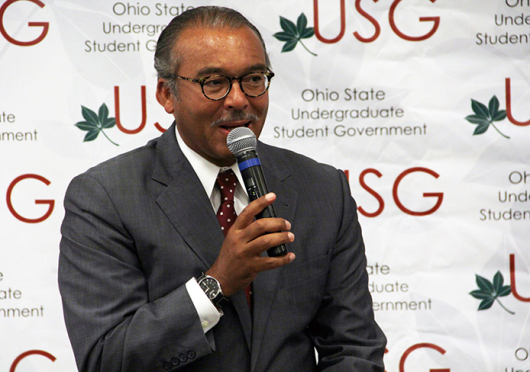
Columbus mayor Michael Coleman speaks at a USG General Assembly meeting Oct. 1 at the Ohio Union about the Columbus Education Plan. Credit: Ritika Shah / LanternTV News director
Seated on the Palace Theatre stage in a plush blue armchair next to local television personality Angela Pace, Columbus Mayor Michael Coleman discussed what he plans to do in the coming months in his final State of the City address on Thursday evening.
During the program, which included opening and closing performances by the Harmony Project, a nonprofit music organization, Coleman stressed the importance of change and shared his vision for his approximately 10 months left in office in a Q-and-A session led by Pace.
“Change is all around us. Just look outside. You can see a transformed downtown, you can see a booming economy, you can see new jobs and restored neighborhoods in every part of our city,” he said. “We are not the same city as we were in 1999. Our most profound transformation is our attitude, our confidence and our purpose of the city.”
Coleman, who hails from Toledo and was elected mayor of Columbus in 1999, said in his address that he would describe the state of the city as “strong.”
“I think we are in a renaissance,” he said.
Coleman mentioned the 40,000 new jobs that have developed in Columbus within the past year, as well as the city having the second-lowest unemployment rate in the nation. Additionally, the violent crime rate is down 24 percent even though the population has increased, Coleman said.
He also cited Columbus’ appearance on several national ranking lists, including Forbes’ “Opportunity Cities,” where Columbus was ranked No. 1, and the city’s No. 4 ranking on Money Under 30’s Top Cities for Young Professionals.”
“They come here and they stay here,” he said of the younger population residing in Columbus.
Other items mentioned in Coleman’s speech included the mayor’s continued focus on developing parkspace and housing downtown, the development of the film industry in the city and the strengthening of relationships with Columbus’ newest sister city in Accra, Ghana, a partnership announced Thursday evening.
Undergraduate Student Government President Celia Wright said she appreciated the mayor’s inclusion of issues like increased educational opportunities for K-12 students, as well as the marketing of Columbus as a viable place for young people to live and work.
“Our university has made our a city a place to live, work and raise a family,” said Wright, a fourth-year in public health. “Columbus is an opportunity city. We are one of the seven most intelligent cities in the world and that is a great draw.”
Wright said although she thinks Columbus is making strides to become more appealing to younger people, it is still up to the city to prove to students and graduates that they should remain in central Ohio. This can be achieved, she added, by Coleman’s plans to better education, increase job opportunities and continue to promote environmentally sustainable living.
Coleman ended his speech with a brief reflection on his 15 years in office.
“In 1999, when I won that improbable election, when I was a thinner man with thicker, darker hair, you elected me to the very best job in the world. On New Year’s Day in the year 2000, we came to the city hall ready to change the world,” he said. “Yet somehow we did in fact change the world. That world is the city of Columbus. We did it together. All of you and I.”


